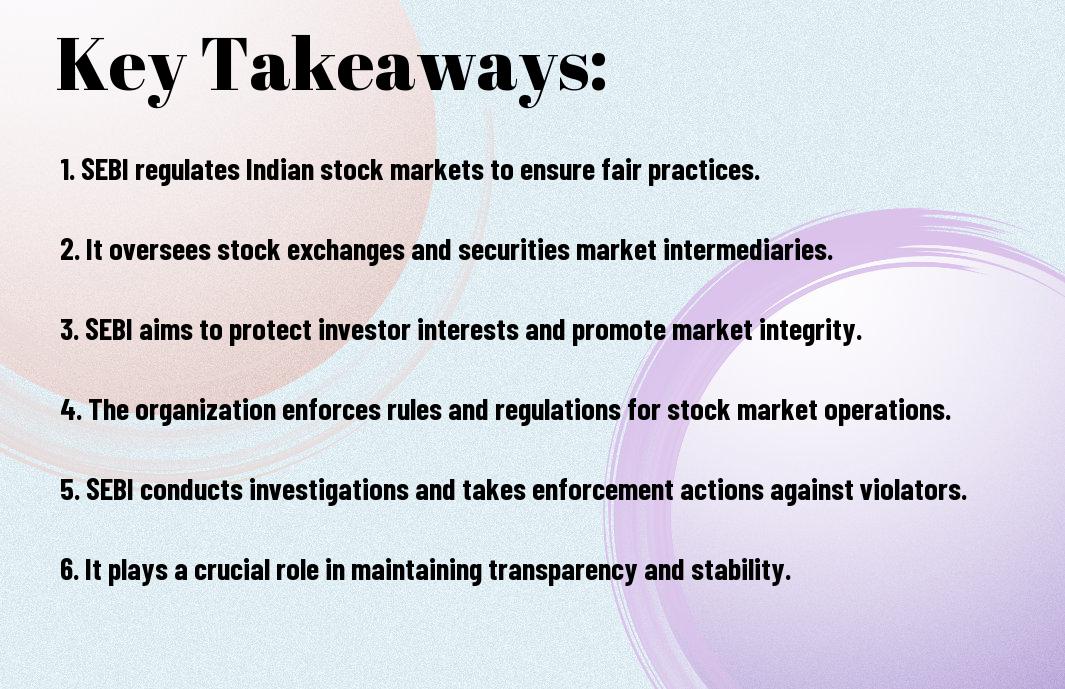Do you know the significance of the Securities and Exchange Board of India (SEBI) in the functioning of the Indian stock market? As an investor, you must understand the crucial role that SEBI plays in regulating and supervising the stock market in India. This blog post aims to provide you with a comprehensive understanding of SEBI’s authority and responsibilities in ensuring the integrity and efficiency of the Indian stock market. From protecting your interests as an investor to maintaining market transparency, SEBI’s impact on the stock market cannot be overstated. By the end of this post, you will have a clear understanding of how SEBI’s regulations impact your investments and the overall market dynamics.
Key Takeaways:
- SEBI is the primary regulator of the Indian stock market: SEBI plays a crucial role in regulating and supervising the securities market in India. It ensures fair and transparent trading practices and protects the interests of investors.
- SEBI has the authority to impose regulations: SEBI has the power to issue regulations and guidelines for the stock market. It can also take enforcement actions against entities that violate these regulations, thereby maintaining market integrity.
- SEBI continuously adapts to market changes: As the stock market evolves, SEBI continuously updates its regulations to keep pace with the changing landscape. It aims to foster a healthy and efficient market environment for all participants.


SEBI’s Regulatory Framework
Clearly, SEBI plays a crucial role in overseeing and regulating the Indian stock market. It has established a comprehensive regulatory framework that governs the operations of the market, ensuring transparency, fairness, and investor protection.
Norms and Guidelines for Market Operation
SEBI has put in place stringent norms and guidelines for the operation of the stock market. This includes regulations for stock exchanges, brokers, and other market intermediaries. It sets requirements for the listing of securities, trading mechanisms, and disclosure standards for companies. Additionally, SEBI continuously updates and revises these norms to adapt to the changing market dynamics and to address any potential loopholes that may be exploited. Adhering to these norms and guidelines is crucial to maintaining the integrity and stability of the market.
Measures for Investor Protection
SEBI has implemented various measures aimed at safeguarding the interests of investors. It requires companies to disclose all relevant information to the public in a timely and transparent manner. SEBI also regulates the conduct of market participants to prevent fraud, manipulation, and insider trading. Additionally, it has introduced investor education and awareness programs to empower you with the knowledge needed to make informed investment decisions. SEBI’s commitment to investor protection is essential in fostering trust and confidence in the market.
SEBI’s Role in Market Development
Despite the volatile nature of the Indian stock market, the Securities and Exchange Board of India (SEBI) plays a crucial role in fostering sustainable market development. SEBI acts as a regulatory authority, ensuring the fair and transparent functioning of the Indian securities market. Its initiatives and regulations are aimed at promoting investor confidence and bringing stability to the market.
Initiatives for Market Expansion
SEBI has taken several initiatives to expand the Indian stock market and make it more accessible to a wider range of investors. One such initiative is the introduction of the SME Exchange, which allows small and medium-sized enterprises to list and raise capital. This has provided a platform for these companies to access funds and grow their businesses. Additionally, SEBI has facilitated the introduction of new investment products such as REITs (Real Estate Investment Trusts) and InvITs (Infrastructure Investment Trusts), enabling investors to diversify their portfolios and participate in the real estate and infrastructure sectors.
Technological Advancements and Automation
SEBI has been at the forefront of technological advancements in the Indian stock market, promoting automation and efficiency in trading and settlement processes. The introduction of electronic trading platforms and dematerialization of securities has significantly improved the speed and accuracy of transactions. Furthermore, SEBI has mandated the implementation of risk management systems and surveillance mechanisms by stock exchanges, ensuring the safety and integrity of the market. These technological advancements have not only streamlined market operations but have also enhanced transparency and reduced the risk of manipulation and fraud.
SEBI’s proactive approach to market development has not only widened the investment opportunities but has also safeguarded the interests of market participants. It has endeavored to create a level playing field for all investors, ensuring that your investments are protected and the market operates with integrity. The initiatives and technological advancements introduced by SEBI have brought about positive changes in the Indian stock market, making it more robust and resilient to external pressures. Despite the challenges, SEBI’s unwavering commitment to market development continues to shape the future of the Indian securities market.
Your blog post:
Enforcement and Actions by SEBI
Lastly, you should also be aware of the enforcement and action capabilities of SEBI. As a market regulator, SEBI holds the power to take action against individuals or entities that violate securities laws. This includes but is not limited to issuing warnings, imposing fines, prohibiting fraudulent or unfair trade practices, and even suspending or canceling market intermediaries’ registrations. You can expand your understanding of this by studying the Role of SEBI as a market regulator on Unacademy.
Surveillance and Investigation Procedures
When it comes to surveillance and investigation procedures, SEBI has the authority to conduct inquiries to ensure compliance with securities laws. This involves monitoring trading activities and conducting investigations into potential violations. By doing so, SEBI plays a crucial role in maintaining the integrity of the market and protecting investors from fraudulent practices.
Adjudication and Penalty Mechanisms
In terms of adjudication and penalty mechanisms, SEBI can adjudicate any matter brought before it and take necessary action, including levying penalties. This not only serves as a deterrent against improper conduct but also reinforces the importance of compliance with securities laws. The penalty mechanisms are put in place to ensure that violators are held accountable for their actions, thereby safeguarding the interests of market participants.
By understanding the enforcement and action capabilities of SEBI, you can gain insight into the measures taken to maintain market integrity and protect investor interests. This knowledge is essential for anyone involved in the Indian stock market, as it directly impacts the operations and conduct within the market.
Challenges and Future Directions
To ensure the stability and integrity of the Indian stock market, the Securities and Exchange Board of India (SEBI) faces a number of challenges and must consider future directions for regulation. Addressing these challenges and planning for the future is crucial to maintaining the market’s strength and protecting investor interests.
Addressing Emerging Market Complexities
As the Indian stock market continues to grow and evolve, it faces new and emerging complexities that could potentially impact its stability. These complexities may include technological advancements, global economic trends, and geopolitical factors. It is essential for SEBI to stay ahead of these emerging market complexities and establish robust regulatory measures to mitigate potential risks. Failure to address these complexities could lead to market instability, investor distrust, and negative economic impacts.
Adapting to Global Financial Trends
The Indian stock market is increasingly interconnected with global financial markets, making it susceptible to international trends and developments. As a result, SEBI must adapt to these global financial trends and ensure that the regulatory framework remains aligned with international best practices. This includes collaborating with international regulators, participating in global regulatory forums, and benchmarking against global standards. Adapting to global financial trends is essential to maintaining the Indian stock market’s competitiveness, attracting foreign investment, and fostering investor confidence.
Understanding the Role of SEBI in Regulating the Indian Stock Market
Conclusively, understanding the role of SEBI in regulating the Indian stock market is crucial for investors and stakeholders looking to participate in the market. By ensuring transparency, fairness, and investor protection, SEBI plays a pivotal role in maintaining the integrity and stability of the stock market. As an investor, it is important to stay informed about SEBI’s regulations and guidelines to make informed investment decisions and navigate the market with confidence. SEBI’s oversight and regulatory functions contribute to the overall functioning and credibility of the Indian stock market, making it imperative for you to understand and acknowledge its role in shaping the investment landscape.
FAQ
Q: What is the role of SEBI in regulating the Indian stock market?
A: The Securities and Exchange Board of India (SEBI) is the regulatory body established to oversee and regulate the securities market in India. Its primary role is to protect the interests of investors and promote the development and regulation of the Indian securities market.
Q: What are the key functions of SEBI in regulating the Indian stock market?
A: SEBI’s key functions include regulating the stock exchanges, registering and regulating the working of stockbrokers, sub-brokers, and other intermediaries in the securities market, promoting and regulating self-regulatory organizations, and prohibiting fraudulent and unfair trade practices. Additionally, SEBI also conducts research and provides education and training for intermediaries to contribute to the development and regulation of the securities market.
Q: How does SEBI ensure compliance and enforcement of regulations in the Indian stock market?
A: SEBI ensures compliance and enforcement of regulations in the Indian stock market through various measures such as conducting inspections, carrying out investigations and audits, imposing penalties for non-compliance, and taking disciplinary actions against market participants who violate the rules and regulations. Additionally, SEBI also works closely with the government and other regulatory authorities to ensure effective regulation and supervision of the Indian securities market.

